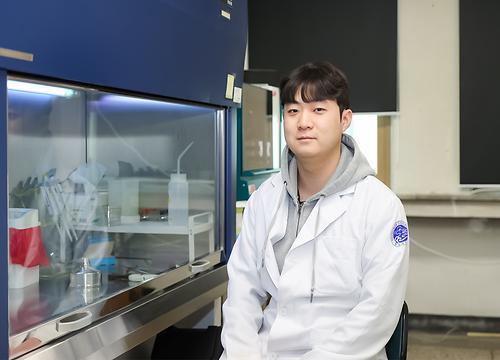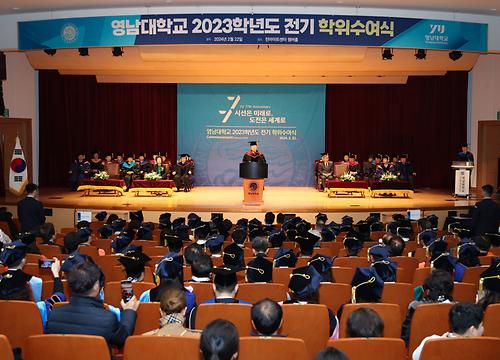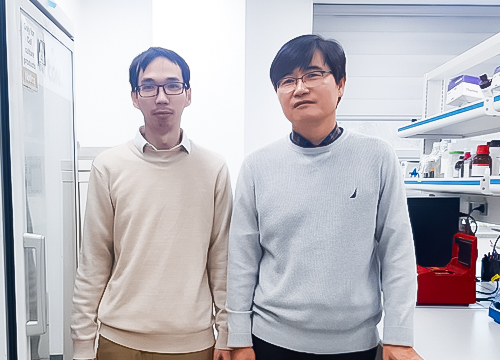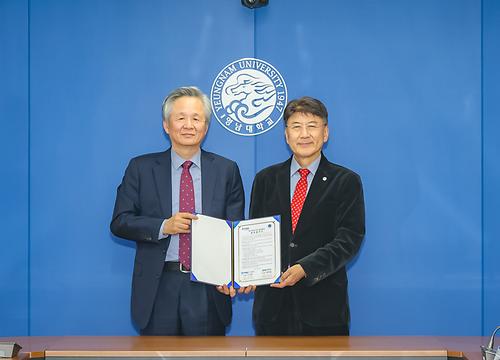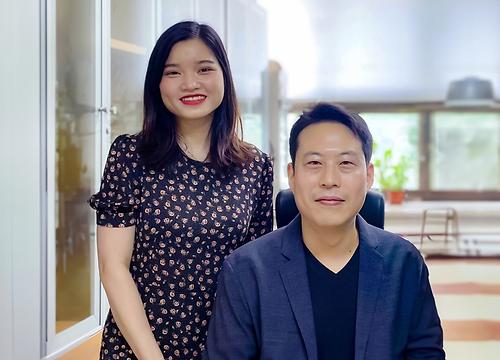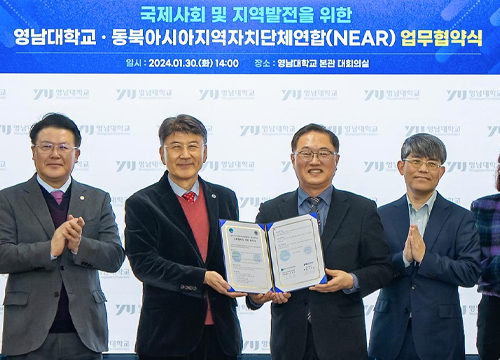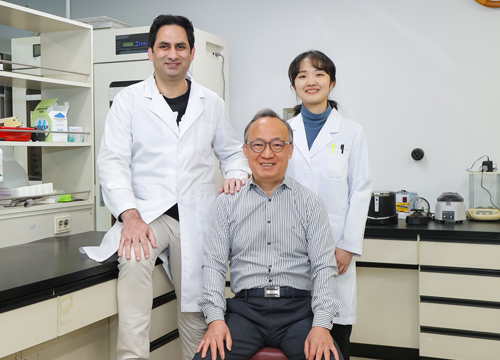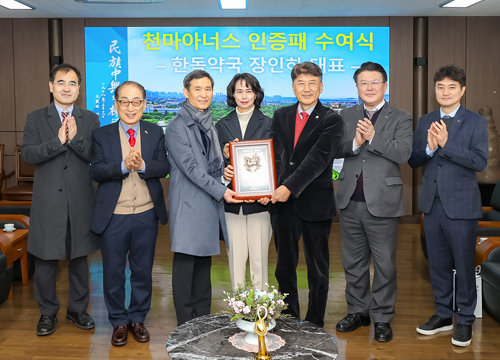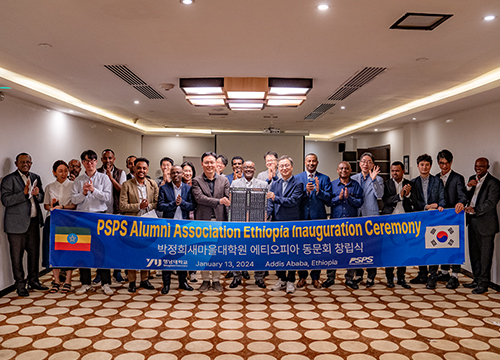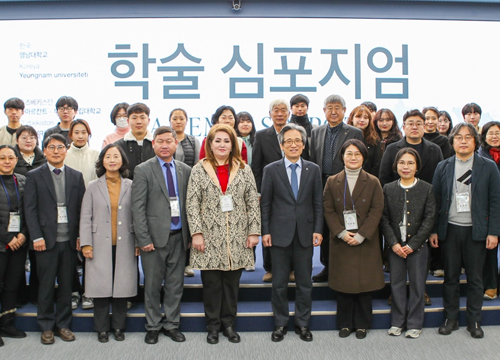-
SHIN Hyeon-seop (25) of the Department of Chemistry published a paper in an internationally renowned journal on March 1, following a publication in August. Research on developing eco-friendly antibacterial materials Undergraduates published in SCIE journal, earn recognition for their research in chemistry [March 08, 2024] <SHIN Hyeon-seop, chemistry student at YU> A student from YU has gained international recognition for research contributions through a series of papers published in SCIE journals. SHIN Hyeon-seop (25), who distinguished himself in research as an undergraduate, published a paper in the Korean Journal of Chemical Engineering (impact factor 2.7) last August, followed by a research paper in Materials Today Advance (impact factor 10.0) on March 1. SHIN's research focuses on developing environmentally friendly antibacterial materials as an alternative to tin compounds that disrupt marine ecosystems. In this study, he discovered an eco-friendly bifunctional material applicable to the energy and antibacterial industries, identifying the catalytic activity site of the material. In the catalyst (Ag@CuZnO), silver nanoparticles are grafted onto copper ion-exchanged particles (CuZnO) instead of zinc, leading to increased photocurrent density and the ability of silver nanoparticles to harvest photoelectrons. The catalyst exhibited excellent antibacterial performance against the marine bacterium Bacillus manliponensis, showcasing the significance of catalytic activity sites over silver content. SHIN explained, "Through this study, we demonstrated that the active site generating hydrogen during water decomposition is the silver nanosurface grafted onto the conduction band of copper, while the active site exhibiting antibacterial performance is the valence electron band of zinc. Since the active sites that exhibit photocatalytic and antibacterial properties are not the same, we found that photocatalytic activity does not always indicate effective antibacterial activity." Professor KANG Mi-Sook, an advisor professor in the Department of Chemistry at YU, said, "This research presents significant findings in the development of eco-friendly antibacterial materials, which contribute to preserving marine ecosystems. It suggests various possibilities for application in the energy and antibacterial industries."
- PR team
- 2024. 03. 14
- 2024. 03. 08
- 6221
-
On the 22nd, degrees were awarded to graduate school graduates, etc., in Chunma Art Center Chamber Hall The colleges and graduate schools produced 96 doctorate, 408 master, and 3,804 bachelor degrees. [February 22, 2024] <On the 22nd, the 2023 first semester graduation ceremony was held in YU Chunma Art Center Chamber Hall> YU (President CHOI Oe-chool) held the 2023 first semester commencement ceremony on the 22nd. All doctoral degree recipients and representatives of master's degree recipients from general graduate schools attended the graduation ceremony held at YU Chunma Art Center Chamber Hall and President CHOI Oe-chool and President Choi Oe-chul and Dean LEE Byeong-jun of graduate school awarded degrees to the graduates and congratulated them. Degrees and diplomas were awarded to seven special graduate schools, including each college and law school, as well as the Graduate School of Business Administration, Graduate School of Environmental Health, Graduate School of Sports Science, Graduate School of Education, Graduate School of Engineering, Graduate School of Culture and Arts and Design, and Park Chung-hee Saemaul Graduate School. On this day, 3,804 bachelor's degrees, 408 master's degrees, and 96 doctoral degrees were given by YU. 176 international students (91 bachelor's degrees, 45 master's degrees, 40 doctoral degrees) also received degrees and 350 undergraduate graduates completed two or more majors and received dual degrees. Chairman HAN Jae-sook of Yeongnam School Corporation said, “I sincerely congratulate the graduates who received honorable degrees today through their hard work over a long period of time. Don’t forget that opportunities are only given to those who prepare themselves. Please do your best to make change and competition an opportunity to further develop yourself. I sincerely hope that our proud graduates will continue to develop into great leaders who will lead the future of our country and people.” At the graduation ceremony that day, President CHOI Oe-chool said, “I congratulate the graduates who have received honorable degrees here today thanks to their hard work and dedication over the years.It is a moment to welcome a new beginning based on the knowledge and experience gained through the academic journey on the YU campus. I hope you will not be afraid of change and always have a positive mind in the challenges and opportunities you will face in the future as the proud members of Chunma. I hope that you will put into practice the founding spirit of the school and become the persons to contribute to human society and common prosperity around the world.”
- PR team
- 2024. 02. 27
- 2024. 02. 22
- 7417
-
Published in “Acta Pharmaceutica Sinica B,” an international academic journal in the field of pharmacology Analysis of the uses and effects of mesenchymal stem cells and adipotectin Research plan to identify the causes of obesity-induced diseases and treat drugs [February 08, 2024] <From the left, Mr. Duc-Vinh Pham and Professor ParK Pil-hoon> Park Pil-hoon (53), a professor of YU Department of Pharmacy, published a paper in the January issue of Acta Pharmaceutica Sinica B (IF 14.5, top 4% in pharmacology/pharmaceutics), an international academic journal in the field of pharmacology. The paper was written by Duc-Vinh Pham (graduated from the doctoral program at YU College of Pharmacy), Thi-Kem Nguyen (Ph.D. candidate), and Professor PARK and has the content that “Adiponectin restores the obesity-induced impaired immunomodulatry function of mesenchymal stromal cells via glycolytic reprogramming” and that adiponectin, a hormone secreted by adipose tissuees, is used for mesenchymal stem cells. Mesenchymal stem cells can be efficiently used for degenerative neurological diseases such as Alzheimer's and Parkinson's diseases and joint diseases, and adipotectin is responsible for metabolic functions beneficial to our body, such as strengthening insulin signaling and lipid metabolism.In this study, the research team found that mesenchymal stem cells isolated from adipose tissue of obese mice, adipotectin restores the cell survival rate and immune regulation function of stem cells and that when stem cells primed with adiponectin are transplanted into experimental animals suffering from colitis, disease treatment efficiency is significantly restored.Through this, they found that adipotectin restores the decline in survival rate and physiological function of mesenchymal stem cells caused by obesity and that the decrease in blood concentration of adipotectin during obesity is associated with the decline in mesenchymal stem cell function. Professor PARK Pil-hoon said, “This study is the first to show in stem cell culture and colitis disease model that adiponectin significantly improves stem cell treatment efficacy by inducing glycolytic reprogramming. We expect to improve the disease treatment efficiency of stem cells through direct use or through the development of drugs that induce the activation of the adipotectin signaling system.” Professor PARK conducted a research on the impact of adipokine, a group of hormones secreted from adipose tissue, on the onset and progression of various diseases caused by obesity and published it in a top journal in the related field. He plans to focus on research to identify the causes of obesity-induced diseases and discover therapeutic drugs.
- PR team
- 2024. 02. 27
- 2024. 02. 08
- 7356
-
Agreement to promote exchange between the two organizations and cultivate local talents Educational support plan such as career and employment programs for current students Searching for the ways to cultivate talents through the cooperation between local universities and public enterprises [February 07, 2024] <YU and Daegu Transportation Corporation signed a business agreement for local community development and talent training. (From the fifth from the left, President CHOI Oe-chool and CEO KIM Ki-hyeok, )> YU (President CHOI Oe-chool) and Daegu Transportation Corporation (CEO KIM Ki-hyeok) signed a business agreement for local community development and talent training. In the agreement ceremony held in the conference room on the third floor of YU main building in the afternoon of the 6th, officials from both institutions, including YU President CHOI Oe-chool, Vice President PARK Seung-woo of Education and Innovation, President KIM Ki-hyeok of Daegu Transportation Corporation, Director KIM Cheol-seop of Management and Safety HQ, and Director KIM Dae-geun of Planning and Coordination Department Division. According to the agreement, the two organizations will conduct ▲ Improvement of joint development and friendship, through mutual exchange and cooperation ▲ Exchange of human and material resources to achieve the common goals of both organizations, ▲ Support of education related to career and employment for YU students, ▲ Joint research and technology development related to transportation, and ▲ Support of Daegu Transportation Corporation's ESG management. CEO KIM Ki-hyeok of Daegu Transportation Corporation said, “I consider the business agreement between YU, a prestigious private school in the region, and Daegu Transportation Corporation, a public enterprise representing the region, to be meaningful. To overcome the crisis of regional extinction, cooperation and win-win efforts between both organizations are essential. I hope that today’s agreement will serve as a catalyst.” President CHOI Oe-chool of YU said, “Daegu Transportation Corporation, which provides safe and convenient public transportation services to the region, and the university should join hands to lead local community development and innovation, provide direction, and open the way for future generations. We will work harder to become a Glocal university that fosters talents who can contribute to human society beyond the region by establishing a human cooperation system.”
- PR team
- 2024. 02. 27
- 2024. 02. 07
- 6606
-
International journal on online consumer marketing <Journal of Research in Interactive Marketing (JRIM)> Won “Outstanding paper” at the 2023 Literati Award Analysis and research on the process of purchasing products used or advertised by influencers [February 07, 2024] <From the left, Research Professor Dingti Kamtu and Professor LEE Yun-jae> Professor LEE Yun-jae (44) of YU Department of Business Administration and Research Professor Dingti Kamtu (31) published a paper through Journal of Research in Interactive Marketing (JRIM), a renowned international journal related to online consumer marketing (impact factor (IF) 10.18, top 13.3%) and won Outstanding Paper Award at the 2023 Literati Award. The paper was published by Professor LEE Yun-jae and Research Professor Dingti Kamtu under the title, “I want to be as trendy as influencers” – how “fear of missing out” leads to buying intention for products endorsed by social media influencers.Research shows that SNS users' desire to be like influencers leads to social comparison, where they compare themselves to others, and in the process of comparison, they develop fear of being left out by others (FOMO: fear of missing out) and materialism. It was confirmed whether the reinforcement leads to the purchase of products used or advertised by the influencer. Professor LEE said, “This study provided insight into consumer culture and how products are selected in the current communication environment, and showed that psychological factors such as materialism and fear of alienation (FOMO) influence consumer behavior and consumption practices. We confirmed that it would be given.” In addition, Professor LEE is conducting various research on consumer behavior in social media. Research is also underway on how social media users share brand-related content and create posts, as well as the spread of materialism and social comparison online.
- PR team
- 2024. 02. 27
- 2024. 02. 07
- 6594
-
Mutual cooperation such as training programs, global education cooperation, and invitation of excellent overseas talents, etc. Request for Saemaul Undong education and training programs to solve various problems in Northeast Asia [January 31, 2024] <YU and The Association of North East Asia Regional Governments signed a business agreement for international community and regional development.> (From the fifth from the left, President CHOI Oe-chool of YU and Secretary-General LIM Byeong-jin of NEAR) YU (President CHOI Oe-chool) and The Association of North East Asia Regional Governments (Secretary-General LIM Byeong-jin) signed a business agreement to promote international community and regional development. At the agreement signing ceremony held in the conference room on the 3rd floor of the main building of YU at 2 p.m. on the 30th, President CHOI Oe-chool of YU, Vice President HEO Chang-deok of International Education Institute, Director LEE Jeong-ju of International Development Cooperation Institute, Secretary General LIM Byeong-jin of The Association of North East Asia Regional Governments (hereinafter referred to as NEAR), Manager YOON Seong-wook of Planning and Public Relations, and Manager CHOI Joo-hwa of International Cooperation attended. Through the conclusion of this agreement, both organizations will join forces for ▲ Mutual cooperation in various events such as training programs and international conferences, ▲ Local global education cooperation, ▲ Cooperation in attracting outstanding overseas talent (international students), and ▲ Mutual cooperation in relation to YU's Glocal University 30 Project. Secretary General LIM Byeong-jin of NEAR said, “I hope that this agreement will serve as an opportunity to utilize the excellent capabilities of both organizations to cultivate talents, to contribute to national development, and to expand areas of cooperation. I hope to find solutions to various problems facing Northeast Asia through YU's Saemaul Undong training programs.” President CHOI Oe-chool of YU said, “We expect to see a synergy effect through cooperation between NEAR, which is active in various fields with the goal of realizing shared prosperity in Northeast Asia, and YU, which is academicizing Korea’s development experience and passing it on to the world. Through today’s agreement, YU will strive to become a glocal university to contribute to the common prosperity of the international community beyond the region by actively promoting global programs, invitation of international students, and training and education programs.”
- PR team
- 2024. 02. 16
- 2024. 01. 31
- 7402
-
Systematic study on the process and response by which sound is detected by plant cells Published in the prestigious international journal, Journal of Advanced Research R&D plan to identify precise mechanism by which sound signals are recognized and transmitted by plants [February 01, 2024] <From the left, Professor Ali Sajad, Professor BAE Han-hong, and student PARK Soo-bin> A paper was published by Professor BAE Han-hong (59) of YU Department of Biotechnology on “Sound detection by plants” in “Hanbitsa” of Biological Research Information Center (BRIC). The paper was published in the Journal of Advanced Research (impact factor (IF) 12.822), an international renowned journal in the field of biotechnology, in December last year under the title of “Understanding the Mechanobiology of Phytoacoustics through Molecular Lens: Mechanisms and Future Perspectives.” Professor Ali Sajad (40), Professor Tyagi Anshika (35), and PARK Soo-bin (Department of Biotechnology, 27), a doctoral student, participated as the co-first authors and Professor BAE Han-hong participated as the corresponding author. Plants are known to have eyes and noses.When a plant is attacked by an insect, it releases volatile substances. These substances are detected by the plant's nose to prepare for defense and, depending on the type of light reflected from the surrounding plants, competing plants can be seen with the eyes.However, researches on the roles of the ear in detecting sounds are still insufficient and only a small number of groups conducted such researches.Professor Bae's research team systematically studied the process by which mechanical signals called sound (sound waves) are detected by plant cells and the reactions that occur thereafter. Professor BAE said, “Based on the results of plant researches using sounds, it is expected that economic effects may be obtained in various fields such as stress-resistant plants, production of useful substances, plant growth promotion, and post-harvest management. We plan to continue researches to identify the exact mechanism by which (sound wave) signals are recognized and transmitted in plants.” Professor BAE’s main research field is “molecular metabolic engineering.”He is studying mechanisms of perception and transmission of sound signals using a model plant, Arabidopsis thaliana.He is also conducting researches on endophytic microorganisms that coexist within plant tissues, like human intestinal microorganisms, on wild ginseng and is focusing on researches related to development of useful substances using endophytic microorganisms.
- PR team
- 2024. 02. 16
- 2024. 02. 01
- 7385
-
Alumnus selected from large development fund donation individuals and organizations for contribution in development of the university Participated in sponsoring a pharmacy school construction fund for juniors at alma mater and pharmacy school So far, donation of KRW 110 million to the alma mater’s development fund… Consistent social contribution activities [February 02, 2024] <From the third from the left, CEO JANG In-ha, spouse PARK Boo-kyung, and President CHOI Oe-chool> In the morning of the 1st, YU (President CHOI Oe-chool) selected JANG In-ha, CEO of Handok Pharmacy, as a member of Chunma Honors and awarded him a certification plaque. Chunma Honors is a donor courtesy program newly established by YU in 2020. It was established to honor major donors who contributed in development of the university and to spread a new donation culture at the university. CEO JANG In-ha is an alumnus of YU Department of Pharmacy, class of '77, and operates Handok Pharmacy in Masan.CEO JANG is always interested in social contribution activities and was selected as Gyeongnam No. 51 member of the Honor Society, a major donor group, for his consistent sharing activities. CEO JANG has also consistently donated development funds to her alma mater, YU.Starting with KRW 20 million in sponsorship funds for the College of Pharmacy in 2005, KRW 10 million was donated each year to the development fund for the College of Pharmacy until 2014. In 2015, she donated KRW 10 million for new construction of the College of Pharmacy and made contributions for current College of Pharmacy equipped with state-of-the-art facilities. The total amount donated so far for the school and juniors amounts to KRW 110 million. CEO JANG In-ha attended the Chunma Honors Certification Plaque Award Ceremony and said, “After thinking about what I could do for my alma mater and my juniors, I started donating and it has come to this point. I thank for giving me the honor of Chunma Honors due to small sharing of what I learned and gained at my alma mater. I feel proud when I see my juniors at the College of Pharmacy studying in a new and good environment.I will continue to support the development of my alma mater and my juniors.” President CHOI Oe-chool of YU said, “On behalf of the university, I would like to thank President Jang for always thinking of his alma mater and his juniors and practicing sharing. Thanks to the College of Pharmacy's excellent researches, educational capabilities, and excellent facilities, and the continued interest and love of alumni including CEO JANG, the Department of Pharmacy recorded the highest competition rate at YU in the application acceptance for the 2024 academic year held last year. I will do my best to help students grow into talented individuals to contribute to human society, just like CEO JANG.” YU selects donors who have contributed greatly for development of the university and have great social recognition and influence among individuals and organizations (groups) that have donated more than KRW 100 million for development funds and grants them membership of Chunma Honors. Until now, over 100 individuals and organizations (institutions) have been selected as members and YU is holding a certification plaque presentation ceremony for the individuals and organizations selected as the members. YU established and operates a donor courtesy program, including awarding certification plaques to Chunma Honors members and invites them as foreign guests to major university events.
- PR team
- 2024. 02. 16
- 2024. 02. 02
- 6718
-
Ethiopian graduates from Park Chung-hee Graduate School of Saemaul established a local alumni association Active in various fields in Ethiopia, including international organizations (Food and Agriculture Organization: FAO), central government, universities, national institutions, and NGOs YU Global Studies Project Team visited Ethiopia and made exchange and cooperation activities with Ethiopia [January 25, 2024] The alumni power of YU (President CHOI Oe-chool) is seen in domestic societies and is also seen in foreign countries, too. An alumni association consisting of Ethiopian graduates from YU Park Chung-hee Graduate School of Saemaul established an alumni association.On the afternoon of January 13th, 14 Ethiopian alumni of YU acting in various fields in Ethiopia gathered at Ethiopian Best Western Plus Addis Ababa Hotel.They attended the “YU Ethiopian Alumni Association Launch” event. From October 2013 to February 2022, 37 Ethiopian graduates were produced by Park Chung-hee Graduate School of Saemaul and are leading development of Ethiopia in international organizations, Ethiopian central and local governments, universities, major national institutions, public enterprises, and NGOs. <Demeke Atlaw Melke (graduated in 2013), first chairman of Ethiopian Alumni Association> Demeke Atlaw Melke (graduated in 2013), who is currently working at the Food and Agriculture Organization (FAO) of UN, was elected as the first alumni chairman.The vice president is Ashik Bedru Mohammed (graduated in 2016) who works at the Environmental Protection Agency of the Central Government of Ethiopia and the secretary is Tsegaye Engida Teklemedhin (graduated in 2017) who works at the Irish Embassy; experts and leaders of various Ethiopian fields participate in the association and are expected to play core roles for regional development of Ethiopia. Chairman Demek Atro Melke of the alumni association said, “I am happy and honored to be elected as the first chairman of the Ethiopian alumni association of YU Park Chung-hee Graduate School of Saemaul. I am deeply grateful to the Republic of Korea and YU for their interest and support for the development of Ethiopia. Especially, I am grateful to President CHOI Oe-chool of YU for playing a big role in transfer of Saemaul Undong and Saemaul Studies to Ethiopia and supporting YU visiting team programs and formation of the alumni association.” and handed over a gift embroidered in Amharic, the official language of Ethiopia. Ethiopian local interest and response to establishment of the alumni association of YU Park Chung-hee Graduate School of Saemaul is hot.Ethiopian National Broadcasting Corporation (EBS: Ethiopian Broadcasting Corporation) and major newspapers (Ethiopian Herald) covered the event, showing their expectations for the performance of YU alumni in the local community. At the alumni meeting on this day, key university officials, including SEO Yong-won (YU Dean of International Studies) and JEONG Jin-young (head of the Husta Water Industry Innovation University Project) also participated.Dean LEE Byeong-wan of Park Chung-hee Graduate School of Saemaul said in a video, “The performances of YU graduates all over the world are remarkable. We expect YU alumni to play a leading role in the development of Ethiopia. I hope that the alumni association will continue to exchange with our alma mater and become a focal point for mutual development between the two countries.” Since the establishment of YU Park Chung-hee Graduate School of Saemaul in 2011, 868 students from 73 countries were enrolled and 765 students from 67 countries received master's degrees such as “Saemaul Studies” and they are working in central ministries, public institutions, and international development NGOs in their countries. The graduates are leading change and development in their own countries and also building global networks to discover new overseas markets and serve as the bridge for public diplomacy. <Photos of local activities by YU Global Study Project Team> Meanwhile, YU Global Study Project Team consisting of 20 YU faculty and staff visited Ethiopia, which pas participated in the Korean War, for 9 days from the 7th to the 15th. This project team returned after making such activities as ▲ Discussions on exchanges and cooperation with Ethiopia's first university, Addis Ababa University, Addis Ababa Science and Technology, and Adama Science and Technology, ▲ Investigation of local ODA project cases, and ▲ Activities for exchanges and cooperation with Ethiopia including visit of KOICA, KOTRA, and the Korean Embassy. YU President CHOI Oe-chool said, “Ethiopia is the most active country in the African region to adopt Saemaul Undong by requesting transfer of education, researches, and operation know-how to YU for localization of Saemaul Undong in the governments, states, and universities. I congratulate establishment of Ethiopian Alumni Association by the graduates from Park Chung-hee Graduate School of Saemaul and hope that the establishment of YU Alumni Association and visit by the project team will become the foundation for development of Ethiopia which participated in the Korean War in spite of no diplomatic relations with Korea and improvement of friendship between both countries.”
- PR team
- 2024. 02. 01
- 2024. 01. 25
- 7366
-
With the subjects of “The public nature of universities and the role of museums” and “History and culture of the Silk Road” Making a plan for continuous academic exchange between universities in both countries and promoting sustainable development Along with the academic symposium, an event to experience the cultures of two countries was also held. [January 17, 2024] <An academic symposium was held at YU Chunma Art Center by YU, Uzbekistan’s Samarkand National University, and Bukhara National University.> On the 10th, YU (President CHOI Oe-chool) and Samarkand National University and Bukhara National University of Uzbekistan held an academic symposium at YU Chunma Art Center of LEE Si-won Global Convention Hall. This academic symposium was jointly hosted by YU Museum, Samarkand State University located at the center of Silk Road, and Bukhara State University located at an altitude of 2,500 years and designated as a UNESCO World Heritage Site. It was held to revitalize cooperation between universities in the two countries and promote sustainable development. This academic exchange was carried out as part of the exchange and cooperation promised by YU’s visiting team to major universities in Uzbekistan in June last year. At the time, YU President CHOI Oe-chool signed an agreement at the request of five major universities in Uzbekistan, which were considered the best in all of Central Asia, for active exchange. Through this, in order to share Korea's development experience, we decided to expand academic exchanges, starting with YU's globally competitive academic fields, including Saemaul Studies. In the first part of the symposium held under the theme of “The public nature of universities and the role of museums,” LEE Eun-jeong (Director of YU Museum) and Dilpooza Jurakulova of (Professor Samarkand University) gave a presentation on the public nature and role of each university museum and had a discussion on the ways for academic exchange between the museums in both countries. Presentations were made by Professor Odil Ergashev on the historical and archaeological excavations and academic achievements of the University of Samarkand. In Part 2, which was held with the subject of “History and Culture of the Silk Road,” KIM Jae-yoon (head of the Department of Culture and Anthropology at YU) gave a presentation on the Eurasian cultural elements seen in the Bangudae Petroglyphs and Cheonjeon-ri Petroglyphs, and researchers from Samarkand University and Bukhara University gave a presentation on the Silk Road’s history and culture. A discussion continued on tangible & intangible culture and its relationship with Korea.In the final general discussion, presenters and audience members from universities around the world had the time to explore the ways to continue academic exchange between YU and Samarkand-Bukhara State University. <Prior to the academic symposium, a cultural exchange event, including a traditional wedding ceremony, was held in the lobby of the YU Museum on the 9th.> Meanwhile, prior to the academic symposium, a demonstration of Korean traditional rites and weddings experience of wearing Hanbok and traditional Uzbekistan clothing, and a performance of Korean traditional music by students of the Department of Korean Traditional Music were shown for professors from Samarkand National University in Uzbekistan and foreign students of YU on the 9th in the lobby of the YU Museum for exchanging cultures between the two countries.
- PR team
- 2024. 02. 01
- 2024. 01. 17
- 7226
